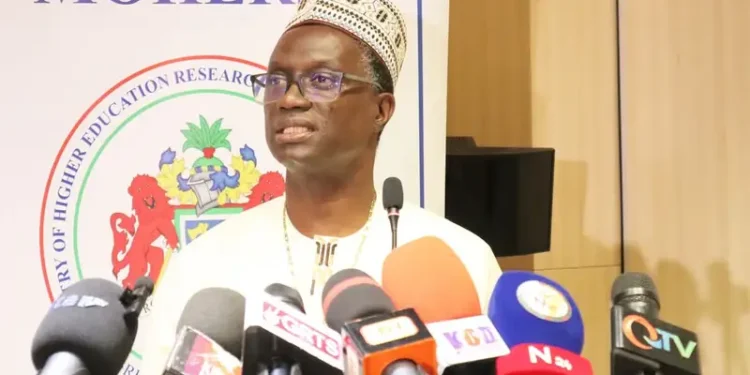The Ministry of Higher Education, Research, Science, and Technology (MoHERST), in collaboration with key partners, has successfully validated the 2024 Technical and Vocational Education and Training (TVET) Graduates Tracer Study Report, marking a pivotal moment in advancing The Gambia’s TVET sector.
Held at the Sir Dawda Kairaba Jawara International Conference Centre in Bijilo, the high-profile event served as a key step toward strengthening and reforming the country’s technical and vocational education landscape. Minister Professor Pierre Gomez, who led the validation process, emphasized the study’s vital role in guiding policy reforms and institutional strategies aimed at improving the skills of the Gambian workforce.
“This report is a foundational tool for shaping our policies, ensuring that we are not only skilling, but also upskilling and reskilling our workforce to meet the challenges of the future,” Minister Gomez stated, reaffirming the government’s dedication to creating a skills-driven economy. He highlighted that the aim is to provide Gambian youth with quality training that guarantees long-term employment and enhances their livelihoods.
Minister Gomez also commended President Adama Barrow for his leadership in prioritizing youth empowerment, particularly through TVET investments, infrastructure development, and fostering stronger public-private sector collaborations.
Funded by the World Bank through the RISE Project, under the Central Project Coordination Unit (CPCU) at the Ministry of Finance and Economic Affairs (MoFEA), the study is designed to evaluate the long-term outcomes of TVET programs. Its data-driven approach will offer valuable insights into employment trends, industry demands, and the career pathways of graduates, providing evidence to inform future decisions.
In her opening remarks, Ambassador Jainaba Jagne, Permanent Secretary of MoHERST, applauded the Ministry’s Technical Working Group for their diligent efforts in reviewing the study and acknowledged the ongoing collaboration among stakeholders.
“This validation process is a testament to our collective commitment to transforming The Gambia’s TVET system, ensuring it is aligned with both national priorities and the evolving needs of the economy,” she remarked.
Jacob Sanwidi, an education expert with the Africa Labor Group (ALG), also spoke at the event, emphasizing the importance of continuous research in shaping effective educational policies. He revealed that ALG is currently conducting a “Decentralized Policies Review Study” to refine education policies in the country.
Project Coordinator at CPCU under MoFEA, Ms. Ndey Anta Taal, further highlighted the significance of evidence-based policymaking. She noted that the findings from the tracer study would serve as an invaluable resource, helping to inform future discussions on TVET and its role in driving economic development in The Gambia.
With the validation of the TVET Graduates Tracer Study Report, there is a renewed sense of optimism that The Gambia is now better equipped to enhance its vocational training sector, ensuring that graduates are prepared to meet the ever-changing demands of the job market.


















































































 EduTimes Africa, a product of Education Times Africa, is a magazine publication that aims to lend its support to close the yawning gap in Africa's educational development.
EduTimes Africa, a product of Education Times Africa, is a magazine publication that aims to lend its support to close the yawning gap in Africa's educational development.